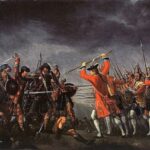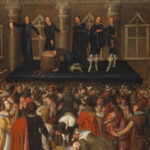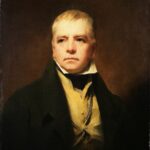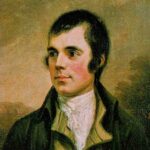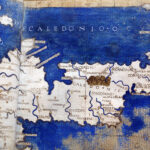Alexander Mackenzie (1764–1820): The Highlander Who Mapped the Wild and Redefined a Continent
Alexander Mackenzie was not a military man in the conventional sense, yet his explorations were campaigns of a different kind—battles against geography, isolation, and the unknown. Born in the rugged north of Scotland and hardened by frontier life in the wilds of Canada, Mackenzie became the first European to traverse North America overland to the Pacific Ocean—a feat that would predate Lewis and Clark by more than a decade. Where generals marched with regiments and banners, Mackenzie moved with traders, voyageurs, and Indigenous guides, relying not on brute force but on endurance, diplomacy, and the cold fire of Highland tenacity. His was a quieter conquest—of rivers, forests, and mountains—and yet one that shifted the geopolitical imagination of an entire empire.
Mackenzie was born in Stornoway, on the windswept Isle of Lewis in the Outer Hebrides, in 1764. His early life was marked by hardship and upheaval. His father, part of the dwindling class of Gaelic-speaking soldiers and tradesmen, emigrated to New York as part of the British effort to control its American colonies. Alexander followed in 1774, just as the American Revolution exploded into war. When his father died in military service, young Mackenzie—then barely a teenager—was sent north to Montreal, into the orbit of the North West Company, one of the great commercial engines of the fur trade. There, far from the castles and courtrooms of Europe, he began a life not in arms but in enterprise and exploration, battling not kings but rivers, snow, and time.
By the early 1780s, Mackenzie was trading deep into the Canadian wilderness, developing a reputation for practical intelligence, fluency in native languages, and an unbreakable will. The fur trade was not merely a business; it was a brutal economic war fought in frozen silence, with birch-bark canoes and pemmican as the coin of the realm. Mackenzie rose swiftly through the ranks of the North West Company, becoming a partner by the age of twenty-four. But it was not enough to trade; he wanted to chart, to go where no white man had gone, to leave a map where there had only been myth.
In 1789, he embarked on his first great expedition—seeking the fabled Northwest Passage, a route to the Pacific that would open commerce from Europe to Asia through the northern wilderness. He traveled from Fort Chipewyan down what would later bear his name: the Mackenzie River, one of the longest in North America. The journey was astonishing in its endurance—over 1,000 miles by canoe—but it ended not in glory, but in bitter Arctic disappointment. He reached the Beaufort Sea, not the Pacific. “I had failed in my main object,” he wrote, with typically stoic understatement, “though I had discovered a vast river system of unsurpassed value.” It was a failure in ambition, but a triumph in cartography.
Undeterred, Mackenzie planned a second expedition—this time aiming directly for the Pacific coast. In 1793, with a small party and Indigenous guides, he departed from Fort Fork on the Peace River, crossed the Continental Divide through what is now British Columbia, and emerged, weeks later, at the salt waters of the Pacific near Bella Coola. There, on a rock still visible today, he painted with red ochre: “Alexander Mackenzie, from Canada, by land, the twenty-second of July, one thousand seven hundred and ninety-three.” He had done what no European had before him—crossed a continent, opening a pathway of imperial imagination and national identity that would later shape Canada’s borders and American anxiety alike. “He was a Highlander of iron,” wrote historian Peter C. Newman, “whose discovery changed not just maps, but history” (Newman, Company of Adventurers, 1985).
But Mackenzie’s triumph was also tempered by loss. His achievement, while spectacular, was not immediately rewarded. The British Empire was focused on European wars and colonial holdings elsewhere, and Mackenzie found himself eclipsed by younger men with better political timing—most notably Lewis and Clark, whose 1804–06 expedition would capture the American imagination more fully. Mackenzie published his Voyages from Montreal in 1801, a meticulous and highly influential narrative, but he never again returned to the wilderness. His final years were spent in Scotland, as a landed gentleman near Avoch on the Black Isle, a quiet exile from the world he had once helped open.
Scotland, in return, was affected by him in subtler ways. Mackenzie embodied the archetype of the Highland diaspora—men displaced by war, cleared from their ancestral lands, who forged identities not through battlefields but through exploration and commerce. He was part of the Scottish contribution to empire—not its politics, but its logistics. His endurance, his methodical recordkeeping, his diplomatic handling of Indigenous peoples—these were the quiet disciplines of empire, born in the misty austerity of a croft in Lewis. “Mackenzie never fought a battle,” wrote historian Ken McGoogan, “but he redrew a nation and helped give it a westward destiny” (McGoogan, Fatal Passage, 2001).
Alexander Mackenzie died in 1820, largely forgotten outside of geographic and fur trade circles. Yet his name survives in rivers, towns, and textbooks. More importantly, his legacy endures in the concept of Canada as a transcontinental nation, connected not merely by rail and road, but by courage, cartography, and the will to endure. In the pantheon of Scots who shaped the modern world, his was not the loudest voice—but his was the hand that traced its outlines.
References
- Mackenzie, Alexander. Voyages from Montreal Through the Continent of North America to the Frozen and Pacific Oceans (1801).
- McGoogan, Ken. Fatal Passage: The Untold Story of John Rae, the Arctic Explorer Who Discovered the Fate of Franklin. HarperCollins, 2001.
- Newman, Peter C. Company of Adventurers. Viking Press, 1985.
- Innis, Harold. The Fur Trade in Canada: An Introduction to Canadian Economic History. University of Toronto Press, 1930.
- Warkentin, Germaine. Discovering the Americas: Explorations of the Americas Before Columbus to the Present. University of Toronto Press, 2007.

